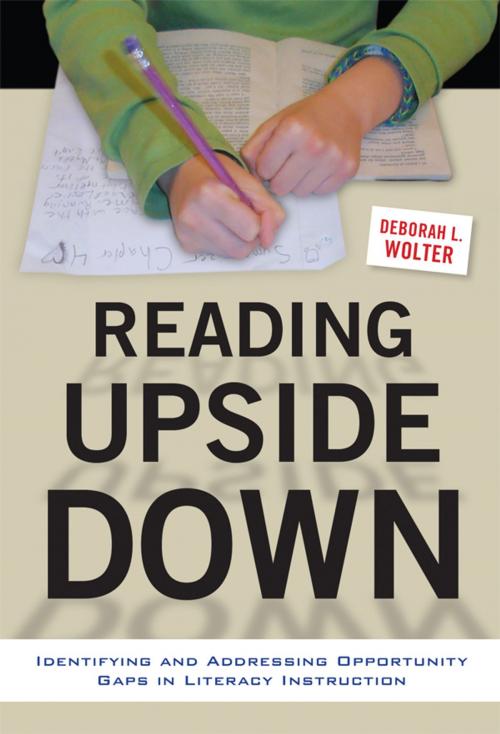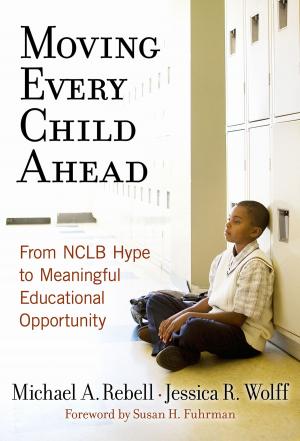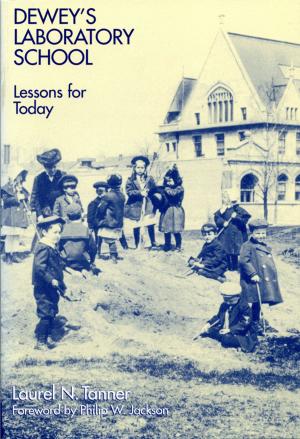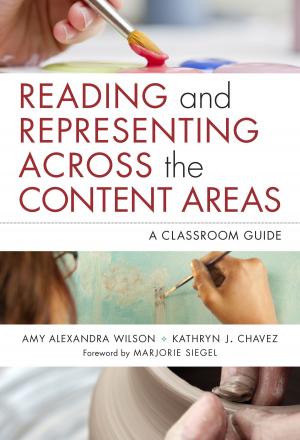Reading Upside Down
Identifying and Addressing Opportunity Gaps in Literacy Instruction
Nonfiction, Reference & Language, Language Arts, Reading, Reading Skills, Education & Teaching, Teaching, Teaching Methods| Author: | Deborah L. Wolter | ISBN: | 9780807773857 |
| Publisher: | Teachers College Press | Publication: | December 15, 2009 |
| Imprint: | Language: | English |
| Author: | Deborah L. Wolter |
| ISBN: | 9780807773857 |
| Publisher: | Teachers College Press |
| Publication: | December 15, 2009 |
| Imprint: | |
| Language: | English |
Reading Upside Down offers a paradigm shift from achievement gaps to opportunity gaps in literacy instruction. Drawing on the author’s rich experiences working one-on-one with challenged readers, this book presents case studies illustrating the complexities of student learning experiences and the unique circumstances that shaped their acquisition of literacy. Wolter explores eight key factors that contribute to reading challenges in developing readers, including school readiness, the use of prescribed phonics-based programs, physical hurdles, unfamiliarity with English, and special education labeling. With a focus on the differences that educators can make for individual students, the text suggests ways to identify and address early opportunity gaps that can impact students throughout their entire educational career.
Reading Upside Down will help educators to:
- Shift from identifying deficit-based achievement gaps among students to addressing opportunity gaps in literacy instruction.
- Move beyond student labels, categories, or placements to provide true opportunities for children to explore and develop literacy.
- Take a strength-based view that students are in multiple places of exploration of language and literacies and all children can succeed in becoming readers.
- Develop a strong sense of ownership and expertise in order to foster inclusion and assure authentic and engaged reading within their classrooms.
“The book not only challenges the status quo but offers a rational alternative that would benefit every struggling reader. I hope Reading Upside Down initiates a widespread movement to undo so much of what we have done in the name of ‘helping’ children who struggle with learning to read.”
—Richard L. Allington, University of Tennessee
“Reading Upside Down is a powerful tool, an eye-opener, a call to arms, and a plan for action. Wolter does a superb job not only identifying and addressing opportunity gaps in literacy instruction but also providing ways to begin fixing them.”
—Patricia A. Edwards, Ph.D., professor of teacher education, Michigan State University, and past president, International Literacy Association
Reading Upside Down offers a paradigm shift from achievement gaps to opportunity gaps in literacy instruction. Drawing on the author’s rich experiences working one-on-one with challenged readers, this book presents case studies illustrating the complexities of student learning experiences and the unique circumstances that shaped their acquisition of literacy. Wolter explores eight key factors that contribute to reading challenges in developing readers, including school readiness, the use of prescribed phonics-based programs, physical hurdles, unfamiliarity with English, and special education labeling. With a focus on the differences that educators can make for individual students, the text suggests ways to identify and address early opportunity gaps that can impact students throughout their entire educational career.
Reading Upside Down will help educators to:
- Shift from identifying deficit-based achievement gaps among students to addressing opportunity gaps in literacy instruction.
- Move beyond student labels, categories, or placements to provide true opportunities for children to explore and develop literacy.
- Take a strength-based view that students are in multiple places of exploration of language and literacies and all children can succeed in becoming readers.
- Develop a strong sense of ownership and expertise in order to foster inclusion and assure authentic and engaged reading within their classrooms.
“The book not only challenges the status quo but offers a rational alternative that would benefit every struggling reader. I hope Reading Upside Down initiates a widespread movement to undo so much of what we have done in the name of ‘helping’ children who struggle with learning to read.”
—Richard L. Allington, University of Tennessee
“Reading Upside Down is a powerful tool, an eye-opener, a call to arms, and a plan for action. Wolter does a superb job not only identifying and addressing opportunity gaps in literacy instruction but also providing ways to begin fixing them.”
—Patricia A. Edwards, Ph.D., professor of teacher education, Michigan State University, and past president, International Literacy Association















